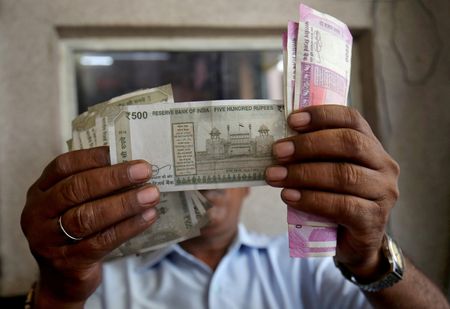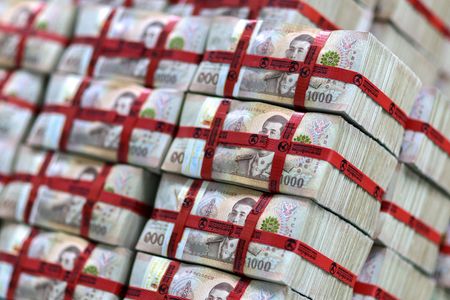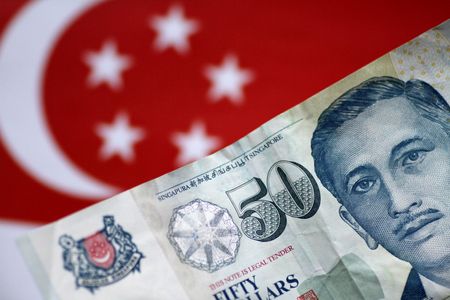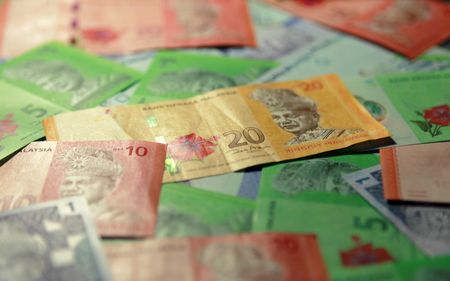 1
1 1
1




By Tejaswi Marthi
(Reuters) – Investors returned to placing bearish bets on all Asian currencies shortly after on the increasing likelihood that the U.S. Federal Reserve would continue hiking rates for longer, helping the dollar regain its lost momentum, a Reuters poll showed on Thursday.
Short bets on the Indian rupee firmed further to hit a three-month high while traders also turned short on the Chinese yuan for the first time since December last year, amid doubts around the country’s economic recovery, a fortnightly poll of 11 respondents showed.
Last month, analysts turned bullish on all Asian FX after a subdued dollar and China’s move to drop its pandemic border controls earlier this year bolstered the upbeat sentiment. However, recent comments from the Fed about hiking rates for longer dampened sentiment.
Since then, a host of strong economic data from the United States, including its stubbornly high inflation print, has been pointing towards resilience in the country’s economic conditions, cementing bets that the Fed will keep hiking rates for longer.
Minutes from the Jan. 31 – Feb. 1 Fed meeting released on Wednesday implied that Fed officials would remain on its rate hike path until data showed that inflation was under control.
“The upshot is that the Fed minutes provided adequate relief to avert a sustained meltdown, but not sufficient to blindly resume ‘Fed pivot’ plays,” said Vishnu Varathan, Economics and Strategy head at Mizuho Bank.
They turned bearish on the Thai baht, Asia’s best-performing currency this year, the Singapore dollar and the Malaysian ringgit for the first time in three months.
“I do not think Fed repricing changes the bigger picture. While the rate hikes would have a near term impact on Asian FX, any positive data from China post its decision to re-open borders will fuel appreciation among the Asian FX,” said Christopher Wong, analyst at OCBC.
Last week, the central bank of the Philippines, Bangko Sentral ng Pilipinas (BSP) hiked its overnight borrowing rate to 6% and said it was unlikely that they would stop hiking interest rates in the next meeting, but flagged a possible end to the tightening cycle in the first half of this year.
Meanwhile, a majority of the Reserve Bank of India’s policy committee members reiterated that it would be premature to lower the guard against inflation.
“Countries with still-active monetary cycles could see relatively more spillovers on the respective rate markets from any further volatility in the Fed outlook,” Goldman Sachs analyst said in a client note.
The Asian currency positioning poll is focused on what analysts and fund managers believe are the current market positions in nine Asian emerging market currencies: the Chinese yuan, South Korean won, Singapore dollar, Indonesian rupiah, Taiwan dollar, Indian rupee, Philippine peso, Malaysian ringgit and the Thai baht.
The poll uses estimates of net long or short positions on a scale of minus 3 to plus 3. A score of plus 3 indicates the market is significantly long U.S. dollars.
The figures include positions held through non-deliverable forwards (NDFs).
The survey findings are provided below (positions in U.S. dollar versus each currency):
DATE USD/CN USD/K USD/SG USD/I USD/T USD/ USD/ USD/PHP USD/THB
Y RW D DR WD INR MYR
23-Feb-23 0.36 0.77 0.21 0.12 0.30 0.80 0.49 0.33 0.37
9-Feb-23 -0.80 -0.63 -0.72 -0.53 -0.68 0.25 -0.6 -0.40 -1.00
4
26-Jan-23 -1.29 -1.14 -1.40 -1.15 -0.68 -0.4 -1.2 -0.78 -1.77
7 5
12-Jan-23 -1.58 -1.39 -1.31 -0.10 -0.67 0.07 -0.8 -0.61 -1.85
2
15-Dec-22 0.08 -0.55 -0.85 0.92 -0.22 0.63 -0.3 -0.15 -0.69
6
1-Dec-22 0.63 -0.15 -0.3 1.08 0.15 0.76 -0.0 0.33 -0.16
2
17-Nov-22 0.74 0.21 -0.06 1.06 0.84 1.13 1.18 0.89 0.4
03-Nov-22 1.81 1.38 0.47 1.57 1.81 1.47 2.02 1.36 1.34
20-Oct-22 1.96 2.02 1.13 1.83 1.98 1.60 2.33 1.94 2.00
06-Oct-22 1.94 2.25 1.53 1.86 2.12 1.55 2.22 2.16 2.08
(Reporting by Tejaswi Marthi in Bengaluru)